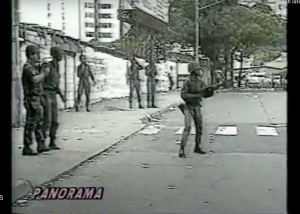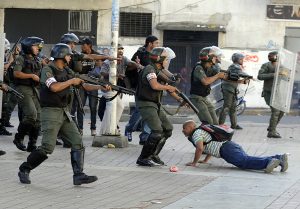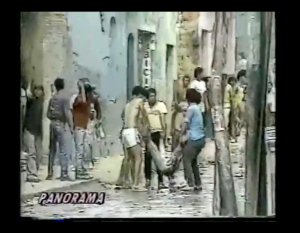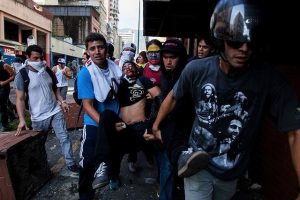This week was a heavily packed one with lots of things to think about. Here’s a couple points I found to be impressive:
- Though Plaza de Madres de Mayo was a campaign that defied the dictatorship in Argentina, it resulted in a level of ‘respect’? I understood it to be very astute, they were not actively rebellious but nevertheless called for attention and action.
- It’s interesting how by looking at the Chilean campaign, ‘NO’ it provides an example of how the media affects. The campaign ad manages to talk to the nation and to spread the voice of middle class peoples, which would have been difficult to previously do because the tv and radio and such mediums would have been greatly managed by the elite. This made me think of how I and other people interact with social media, especially with movements such as black lives matter, abortion-rights, voter projects, and general international human right activism. I’ve read about criticism about how there is the mistake that many think that by solely posting something, they are inherently fighting against it, which in turn causes a complacent blindness to take actual action. A disconnection perhaps? I personally have asked myself if by posting I am hopping on a “trend”, and therefore disrespecting the real victims of situations? And that’s where I think the ‘NO’ campaign in Chile provides an answer, spreading awareness. Perhaps not it’s not a physical nor direct action against the “subject” but by bringing attention to it, they’re calling for a greater voice. And that is where that idea comes in, that we need to speak truth to people, to be able to speak truth to power.
- During the lecture it was very impressive to see the videos of El Caracazo because if I hadn’t known any better, I would have mistaken them for the protests in Venezuela that started in 2014. The national guard in 1989 took charge of fighting against the protesters resulting in mass deaths, as did happen in 2014, 2017, and when Juan Guaido proclaimed himself as interim president. The difference being that while El Caracazo served as a springboard for Hugo Chavez to take power in Venezuela, now the protests of the twenty first century have been against the succession of power of Chavez’s government.




- ALSO I have heard repeatedly from people of various Latin American countries that their nation is on the way to becoming a Venezuela, such as Mexico, Nicaragua, Peru, Chile, and Argentina. I mention this because one of the reasons the protests began in 1989 in Caracas was about the neoliberalism policies that the government presented, an example specifically because of an increase on bus fares and gasoline. This reminded me of the Chilean protests that began in 2019, one of the reasons being the raise of Santiago’s Metro subway fare. Which has similarities with that protests in Venezuela, burning of buses, closing of streets, and forming of barricades. Are they on their way to becoming a Venezuela? Gosh I hope not.
- Also I found interesting the connection that drug trafficking has to do with Latin America and its people. Organized crime develops out of extortion or corruption of weakened countries. I saw a short docu-series where they film in Medellin, Pablo Escobar’s hometown and converse with Popeye, Escobar’s primary hitman. What I found impressive was how Escobar is still a figure of respect for some in Medellin, which is a testimony to Colombian’s sentiments towards their government because he claimed to be against the government, proving the people’s discontent. Drug war activism is relatively new, emerging after the fall of drug lords, partially because they presented themselves to be “for the people” and take away from the government.
Discussion Question: I don’t understand why the “celebrated transitions” of democracy did not bring real freedom and peace in Latin America? In comparison to how it developed in North America or Europe? Though I do remember that in the video with Rita Granadis, she mentions that a reason would be due to colonization and strongly ingrained racial divisions.
mirella reichenbach livoti
November 25, 2020 — 3:40 pm
Hi Nitya,
I think that there is a lot to unpack from your discussion questions. I first reason why I think that the “celebrated transitions” of democracy did not bring real freedom and peace was because of the lack of transparent information what happened during the dictatorships, including the exact number of people who were killed and what happened to those who were forced disappeared. In addition, given the numerous human rights violations I think that the memories of the dictatorships made it hard for people to trust political leaders and their promises. Another important thing to consider is that the social inequalities that were kind of covered up during the dictatorships didn’t go away and that with the re-establishment of democracy, political leaders had to directly address all these inequalities that had largely been covered up. I think to this day it is questionable whether or not democracy has been fully established in Latin America but also in North America. After the dictatorship ended in Brazil, a new constitution was written in 1988, nicknamed the citizen constitution, however, to these day some of the rights inscribed by law are not fully recognized such the protection of Indigenous lands (land demarcation).
Hannah Foster
November 26, 2020 — 9:03 pm
Hi Nitya
I agree with Mirella. I think because so much was hidden and so much wrong was done by the government that people lost their trust in it. Not only that but like you mentioned drug trafficking became much stronger when their were dictatorships or corrupt government. This was only strengthened over time and I feel like at this point their are so strong it’s hard to fight against it. When you mentioned Mexico becoming Venezuela, I was reminded of so friends who are currently trying to move to Canada for that exact reason. They are so scared with what is happening their. Great discussion post!